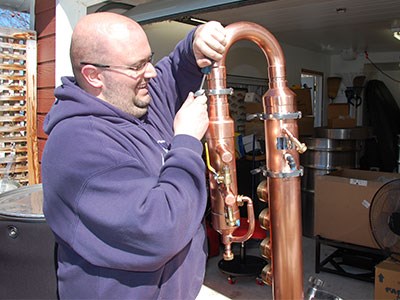Justin Frape has developed a fascination with a strange potion that’s sold in tiny apothecary bottles.
The well-known Thunder Bay businessman has transformed an abiding interest in distilled spirits into a major career move in launching Frape & Sons, manufacturing bitters using locally sourced grains.
On a warm April day, Frape and his father were in his garage unpacking boxes containing components of his still shipped north from Kentucky and Tennessee.
The mash tun, hot liquor tank, fermenters and boilers had arrived from Bubba’s Barrels of Knoxville, Tennessee. The “Hillybilly flute,” otherwise known as the reflux common still, came from Hillbilly Stills in Barlow, Kentucky.
Embarking on bitters is a radical departure from Frape’s previous profession as a tax specialist assisting small businesses with federal research and development credits.
After being introduced to Kentucky bourbon at a party, he began researching production methods and embarked on distillery tours.
“The more I dug into it, the more it felt like a calling. It’s science, it’s creative and it’s producing something. Rather than holding an amended corporate income tax return I can hold a bottle and say, I made this.”
His business partners are Jay Stapleton, owner of the Waking Giant Coffee, who’ll work on the formulations, and Jeff Burke of Brule Creek Farms, who’ll supply and mill grains like hard-red string wheat, rye and buckwheat.
The grains are fermented and distilled to form the alcohol base. The botanicals are infused using a vapour infusion technique to produce bitters. Frape said it will produce a flavour unlike any other on the market.
After being largely forgotten for decades, bitters are making a bit of a comeback.
“With the craft cocktail revival it’s been recognized as a finishing element,” or, as one local bartender conveyed to Frape, it’s considered the “salt and pepper.”
It’s highly concentrated stuff and is used by the dash – or an eye dropper – to flavour alcoholic and non-alcoholic beverages.
This year’s plans are to produce 60 to 65 batches, a batch being 32 litres. The 100-millilitre bottles he’ll sell for $20 each.
His first offering, a coffee-flavoured bitter, will show up at the local farmers market and on Amazon this spring. He’s also working on some national wholesale and distribution channels.
He’s approached an Anishinaabe medicine man to help with the botanical formulations and some farmers have offered to set aside test plots.
With a stockpile of chokecherries, blueberries and rhubarb, he’s entertaining the idea of producing between six and eight flavours. “There’s a quite a palate we can do with local ingredients.”
Eventually, he would like to expand into beverage alcohol. “I would love to make whiskey and gin.”
But the combined tax regime in Ontario is too cost prohibitive to establish a distillery in Thunder Bay, said Frape.
“The way the excise memoranda and the associated provincial legislation is written you can calculate that 78 per cent of the sale price of spirits go to the federal and provincial governments between environmental levies, excise duties, fees, freight, LCBO mark-up, etc, etc.”
Categorized differently than beverage alcohol, bitters are exempt from duty because it’s considered non-potable.
“I have to put my corporate tax hat on and say, what is the best way to accomplish this? At this point, Ontario is not an environment that’s conducive to small distillers.”
Other jurisdictions in Canada and the U.S. have made tax exemptions or breaks for small distillers to encourage the agri-food sector.
“Minnesota is one of them,” said Frape. “The licensing is a fraction of the cost of small producers than for large.”
Should his distillery plan take root, he’s considering Hovland, Minn. where he has a handshake agreement with a local brewery to supply him with cooked wort.
Frape said the Wine Council of Ontario has been very effective at modernizing tax laws so they don’t lose the lion’s share of their revenue, but it’s an uphill climb for small distillers like him.
“I’m a band of one at the moment.”




